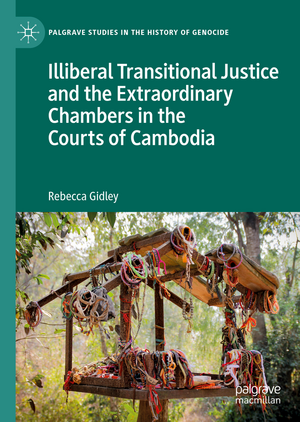Illiberal Transitional Justice and the Extraordinary Chambers in the Courts of Cambodia: Palgrave Studies in the History of Genocide
Autor Rebecca Gidleyen Limba Engleză Hardback – mar 2019
Preț: 529.28 lei
Preț vechi: 622.68 lei
-15% Nou
Puncte Express: 794
Preț estimativ în valută:
101.28€ • 106.01$ • 84.30£
101.28€ • 106.01$ • 84.30£
Carte tipărită la comandă
Livrare economică 31 martie-14 aprilie
Preluare comenzi: 021 569.72.76
Specificații
ISBN-13: 9783030047825
ISBN-10: 3030047822
Pagini: 260
Ilustrații: XI, 250 p. 8 illus.
Dimensiuni: 148 x 210 mm
Greutate: 0.47 kg
Ediția:1st ed. 2019
Editura: Springer International Publishing
Colecția Palgrave Macmillan
Seria Palgrave Studies in the History of Genocide
Locul publicării:Cham, Switzerland
ISBN-10: 3030047822
Pagini: 260
Ilustrații: XI, 250 p. 8 illus.
Dimensiuni: 148 x 210 mm
Greutate: 0.47 kg
Ediția:1st ed. 2019
Editura: Springer International Publishing
Colecția Palgrave Macmillan
Seria Palgrave Studies in the History of Genocide
Locul publicării:Cham, Switzerland
Cuprins
1. Introduction.- 2. The State of Transitional Justice.- 3. Confronting the Past, 1975-1996.- 4. The Development and Evolution of the ECCC, 1997-2003.- 5. The ECCC in Action, 2003-2018.- 6. Breaking the Mould: Cambodia and the Transitional Justice Literature.- 7. Distinguishing Cambodia and Explaining the Existence of the ECCC.- 8. Conclusion.
Notă biografică
Rebecca Gidley teaches history and international relations at the College of Asia and the Pacific, Australian National University. She has published on topics including narratives of mass atrocities, the physical location of courts, and the role of historians as expert witnesses.
Textul de pe ultima copertă
This book examines the creation and operation of the Extraordinary Chambers in the Courts of Cambodia (ECCC), which is a hybrid domestic/international tribunal tasked with putting senior leaders of the Khmer Rouge on trial. It argues that the ECCC should be considered an example of illiberal transitional justice, where the language of procedure is strongly adhered to but political considerations often rule in reality. The Cambodian government spent nearly two decades addressing the Khmer Rouge past, and shaping its preferred narrative, before the involvement of the United Nations. It was a further six years of negotiations between the Cambodian government and the United Nations that determined the unique hybrid structure of the ECCC. Over more than a decade in operation, and with three people convicted, the ECCC has not contributed to the positive goals expected of transitional justice mechanisms. Through the Cambodian example, this book challenges existing assumptions and analysesof transitional justice to create a more nuanced understanding of how and why transitional justice mechanisms are employed.
Caracteristici
Examines how the Extraordinary Chambers in the Courts of Cambodia operated since they were created Explores how narratives of the Khmer Rouge informs understandings of, and politics of, contemporary Cambodia Argues that the Extraordinary Chambers in the Courts of Cambodia are an example of illiberal transitional justice












